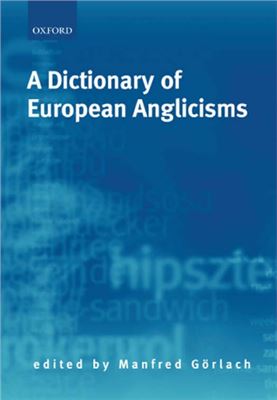Oxford University Press. 2005. — 352 pages. ISBN:0199283060
Первый в своем роде словарь англицизмов в европейских языках:
исландском, норвежском, нидерландском, немецком, русском, польском,
хорватском, болгарском, французском, испанском, итальянском,
румынском, финском, венгерском, албанском и греческом. Словарь
показывает, как англицизмы были распространены в этих языках к 1990
году, после чего они стали стремительно проникать в Восточную
Европу и Россию. Многие англицизмы имеют в описании квадрат,
разделенный на 16 частей – белых, заштрихованных и черных, что дает
графическое представление о его распространенности в тех или иных
языках.
A Dictionary of European Anglicisms documents the spread of English
in Europe. It provides the first exhaustive and up-to-date account
of British and American English words that have been imported into
the main languages of Europe. English, which imported thousands of
words from French and Latin (mainly after 1066), is now by far the
world's biggest lexical exporter, and the trade is growing as
English continues to dominate various fields ranging from pop music
to electronic communication. Several countries have monitored the
inflow of anglicisms and some have tried to block it. But language,
as lexicographers have always found and as this book demonstrates
once more, respects neither boundary nor law. The dictionary not
only shows which words have been exported where, but how the
process of importation can change a word's form and function,
sometimes subtly, at others remarkably as in the transformation of
painkiller to Bulgarian 'jack of all trades'. The book provides a
systematic description of the lexical input of English into
Icelandic, Norwegian, Dutch, German, Russian, Polish, Croatian,
Bulgarian, French, Spanish, Italian, Romanian, Finnish, Hungarian,
Albanian, and Greek. Each entry has a brief definition of the loan
word, followed by information on its history and distribution;
variations in its spelling, meaning, and pronunciation; its route
of transmission if not direct from English; its degree of
Görlach Manfred. A Dictionary of European Anglicisms: A Usage Dictionary of Anglicisms in Sixteen European Languages
Словарь

- формат pdf
- размер 33,96 МБ
- добавлен 14 января 2015 г.

